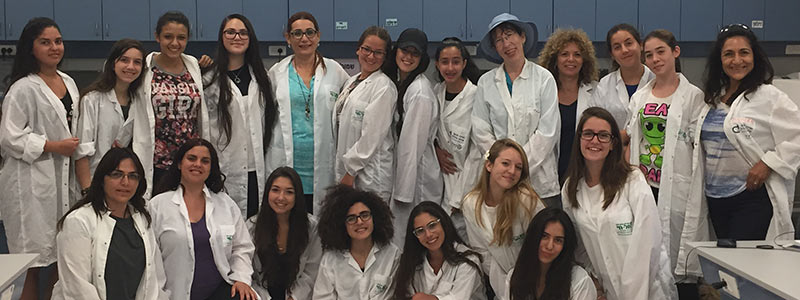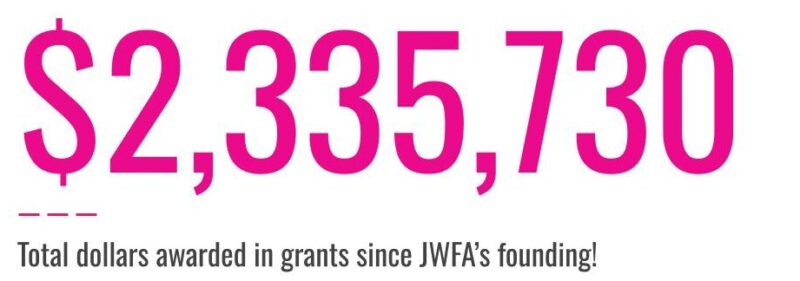Grants
Jewish Women’s Fund of Atlanta utilizes strategic grant-making to expand opportunities in the lives of Jewish women and girls. Each year, JWFA accepts proposals from potential Grantee Partners and makes allocations according to a group decision-making process. Unlike other organizations where a small committee determines funding allocations, Jewish Women’s Fund of Atlanta prides itself in maintaining a “one woman, one vote” policy, whereby each Trustee has an equal opportunity to participate in the grant-making decisions.2024 Grantee Partners
JFNA Israel Emergency Grant: An emergency grant to the Jewish Federations of North America’s emergency campaign for Israel, sent to the Jewish Federation of Greater Atlanta on October 8.
Sustaining Grants: In order to ensure we could diversify our grants portfolio and welcome new grantees, we began a three-year process of weaning down those who had been receiving grants for five or more years in 2022. This is their final year of funding from this process.
Center for Women’s Justice* Support of the “Legal and Public Advocacy for Women’s Rights” project, defending women’s rights to equality, dignity, and justice whenever they are compromised in the name of religion.
HaMidrasha* Our Gendered Eyes program invites 600 pre-army teens to conduct an identity process of examining attitudes towards the roles of different genders in today’s modern society.
Jerusalem College of Technology* General operating support which provides Ultra-Orthodox women exposure to the hi-tech ecosystem and training in innovative thinking and business development. Women participate in programs such as The LAB Pre-Accelerator Program, Hackathons, PreNovation, Industry-led workshops, and a new program called Founders Hats.
jGirls+ Supporting a new initiative called Learning Together, designed to support Jewish girls, young women, and nonbinary folks ages 16-22 in examining power, responsibility, and the issues that most deeply impact their lives through Jewish and gender lenses.
La’Ofek* Continued support of the Achotenu-Nachshonim program which puts Ethiopian-Israeli women on a path toward stable financial futures through higher education in nursing and occupational therapy.
Makkom* Project Lionesses improves the services available for young single mothers, focusing both on young mothers’ immediate needs and legislative action.
WePower* Providing women with tools, knowledge, and skills for leadership and for developing effective communication strategies while facilitating networking and mutual support; WePower’s efforts strengthen Israeli democracy and increase women’s representation in leadership and government, thus ensuring a more equitable and pluralistic civic society.
Women’s Spirit* Advocates to change fundamental Israeli policies and laws that undermine, destabilize, and weaken women, but especially victims of gender-based violence. Focuses on rewriting the story of women survivors of abuse so they can overcome professional and occupational barriers, establish economic independence, and regain control of their lives.
Yozmot Atid* “Realizing My Business Dream” is a flagship program that works with women from across Israel’s social and geographic periphery to help them achieve financial independence, helping them launch, run, and grow small businesses of their own.
Supplemental Sustaining Grants: An additional $5,000 each was granted to JWFA’s eight Israeli-based Sustaining Grantees (indicated with an asterisk* above) to support their work post-October 7.
Women’s Leadership Grants: In its second year, these grants enable Atlanta Jewish communal senior professional women to access professional development opportunities.
- Elana Frank (Jewish Fertility Foundation)
- Davida Merlis Graber (Atlanta Jewish Academy)
- Suzanne Hurwitz (Temple Beth Tikvah)
- Joanna Kobylivker (Adamah ATL)
- Rabbi Rachael Miller (Temple Emanu-El)
- Rabbi Malka Packer-Monroe (18Doors)
- Debra Shaffer Seeman (Prizmah)
Impact Grants: Our core annual grants, focused on providing funding for organizations and projects which further our mission to drive social change for Jewish women and girls.
Association of Rape Crisis Centers Israel: Real-time response to the profound impacts of the ongoing war post-10/7 by providing vital support to survivors of sexual violence, including first responders, family members, and individuals. AARCI has also expanded its outreach and advocacy to the global stage, raising awareness internationally about those affected by sexual violence during the war.
BeNetivey Udi: The “Nitzanim: WomenTech” operates in collaboration with the IDF’s Computer Service Directorate to ensure more women successfully integrate and complete military service in core IDF technological units, including the most advanced and prestigious tech units, providing the young women the invaluable opportunity to pursue prestigious careers.
Itach Ma’aki: The Legal Aid Hotline offers free direct legal services to women in need, specializing in employment and welfare law. Through outreach to the Hotline, they analyze social and legal injustices toward women and promote policy advocacy work at the national level. This year’s focus includes the impact of the war on threats to women’s employment.
Jewish Fertility Foundation with NCJW*: “A Post-Roe World: Education and Advocacy” project will launch a PR advocacy and educational campaign following Alabama’s ruling on fertility rights. This collaboration with NCJW features an educational series, digital resources, and a media campaign.
MATI Jerusalem: TURNING POINT is a comprehensive program aimed at helping Jewish women in Jerusalem improve their socio-economic status by setting up and expanding independent businesses. The program empowers women to overcome gender discrimination and sexist social barriers concerning occupational pathways, helping them achieve economic resilience.
Mavoi Satum: An Israeli woman cannot leave her marriage without her husband’s approval, a reality that leaves thousands of women trapped in unwanted marriages due to their husbands’ refusal to grant them a get (Jewish writ of divorce). Mavoi Satum’s mission is to create a world without agunot (a woman trapped in her marriage) in which every Jewish woman is entitled to the basic right to leave her marriage freely, and strategically combats marriage entrapment and divorce refusal. In response to the changes in Israel since October 7, Mavoi Satum has intensified their multi-pronged strategy of public advocacy, legislative activism and reform, and legal and psychosocial assistance.
Physicians for Human Rights Israel: PHRI’s Health Policy in Israel Department promotes gender equality in the Israeli healthcare system and combats practices that limit women’s reproductive freedoms. The project will continue to promote access to abortions in Israel (as covered by JWFA’s previous grant to the Coalition on Reproductive Rights in Israel) and will promote the inclusion of varied, accessible forms of contraception in the public basket of health services. Additionally, the project will work to eradicate gender-based violence within the Israeli public health system and continue to advocate for victims of sexual and gender-based violence during the October 7th Hamas attack on Israel.
Shalom Task Force*: Future Community Leaders (FCL) is designed to equip junior and senior young women attending all-girls Bais Yaakov and Jewish High Schools (including Temima, The Richard & Jean Katz High School for Girls in Atlanta) with the skills, knowledge, and professional experience to become leaders in their schools and communities through the lens of gender violence, empowering young them to combat intimate partner violence (IPV).
Shavot: This project provides girls ages 11-13, in the underprivileged municipality of Migdal Ha’Emek, with educational and interpersonal tools and skills to pursue STEM education and high-tech employment, focusing on their confidence and sense of efficacy.
The Rackman Center for the Advancement of the Status of Women at Bar Ilan University: Following the devastation of Oct. 7 in Israel and the subsequent war, The Rackman Center continues its core programming alongside dealing with war-related issues, primarily the gender atrocities committed by Hamas. They have become a leader in the current crisis due to their history of defending women’s rights and expertise in family law.
Women’s Rabbinic Network: A partner of the Reform Movement, WRN provides pastoral support, ongoing education, mentorship, networking, and a haven for 650+ female-identified, nonbinary, and genderfluid rabbis. They advocate for safe, respectful Jewish communities, narrowing the gender-based wage gap, guaranteeing paid family and medical leave, and ensuring equitable advancement in professional and lay leadership.
_______
TOTAL GRANT ALLOCATION:
- JFNA Israel Emergency Grant: $10,000
- Sustaining Grants: $29,650
- Supplemental Sustaining Grants:$40,000
- Women’s Leadership Grants: $24,800
- Impact Grants: $229,000
2024 GRANTS TOTAL: $333,450
TOTAL ALLOCATIONS TO DATE: $2,333,730
To view a list of JWFA’s past Grantee Partners, click here.


